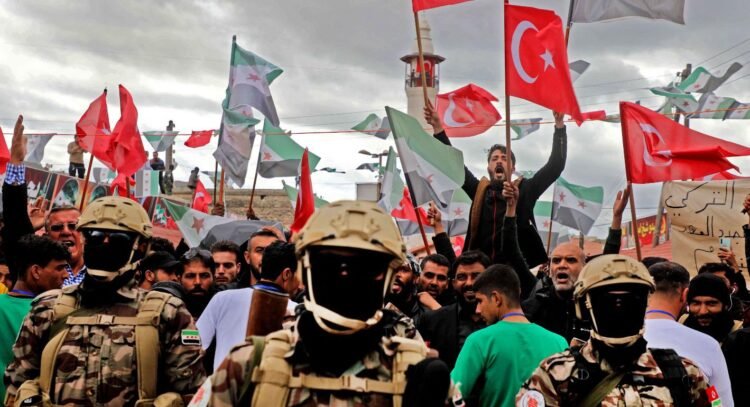Introduction
In recent years, Turkey has played a pivotal and influential role in regional developments, particularly in Syria. The country managed to advance its interests during the Syrian conflict with minimal costs, leading to the downfall of Bashar al-Assad’s regime, while the influence of the Islamic Republic of Iran and its IRGC forces in Syria was significantly curtailed. (The main aim is to compare Turkey’s structure with that of the Islamic Republic, as well as comparing Syria’s structure to Iran’s in a different context—examining why Turkey succeeded while the Islamic Republic failed, and how Syria fell, leaving Iran on a similar path of collapse and disintegration.)
This analysis first examines the components of power, then compares Turkey to the Islamic Republic of Iran, and concludes with key takeaways.
Components of Power
A country’s power can be categorized into two main elements: tangible and intangible factors, which will be discussed in detail below.
1. Tangible Components of Power
Tangible elements are measurable and directly indicate a country’s ability to exert influence.
A) Economy
- Natural Resources: Oil, gas, minerals, water, forests, and agricultural lands.
- Economic Output: Gross Domestic Product (GDP), key industries, and export capabilities.
- Infrastructure: Transportation networks, energy grids, and communication systems.
- Financial Resources: Foreign reserves, investment capacity, and a stable banking system.
B) Military Power
- Military Equipment: Tanks, aircraft, warships, and advanced weaponry.
- Nuclear Capability: Deterrence through nuclear weapons.
- Human Resources: Number and training of armed forces personnel.
- Military Bases: Operational capabilities and strategic deployment.
C) Population and Human Capital
- Population Size: A source of labor and consumer markets.
- Demographics: A young and educated population.
- Public Health: Physical fitness and general well-being.
D) Natural Resources
- Energy: Reserves of oil, gas, and renewable energy.
- Water and Agriculture: Freshwater resources and fertile lands.
- Minerals: Reserves of gold, copper, iron, and other critical minerals.
E) Geographic and Strategic Position
- Geographical Location: Proximity to trade routes and strategic regions.
- Climate Conditions: Suitability for agriculture and habitation.
- Land Area: Access to natural resources.
2. Intangible Components of Power
Non-material factors also play a crucial role in shaping a country’s power.
A) Legitimacy
Public support for the government strengthens its legitimacy and facilitates the exercise of power.
B) Ideology
Political and cultural ideologies, such as democracy or political Islam, enhance internal cohesion and soft power.
C) National Identity
Cultural, linguistic, and historical unity among citizens is vital for internal stability.
D) Public Opinion and Social Participation
Social support for government policies bolsters influence and legitimacy.
E) Charismatic Leadership
Influential leaders can rally public trust during crises.
F) Social Capital
Trust and cooperation among members of society enhance the soft power of governments.
Syria under Bashar al-Assad
Bashar al-Assad came to power with promises of “reform and development” but failed to reduce inequalities. Instead, his policies intensified class divisions and suppressed the population.
A) Economic Reforms
Assad’s limited economic reforms benefited a small elite loyal to the regime while alienating workers and rural communities.
B) Foreign Policy
After the assassination of Rafik Hariri and the Cedar Revolution in Lebanon, Assad was forced to end Syria’s military presence in Lebanon.
C) Domestic Policy
The first decade of Assad’s rule was marked by censorship, repression, and widespread atrocities. Following the crackdown on popular protests in 2011, Syria descended into civil war, with the regime accused of war crimes and chemical weapon use.
Ultimately, Assad’s regime fell in December 2024, and he sought refuge in Moscow.
Comparing Turkey and the Islamic Republic of Iran
Both Turkey and Iran have played significant roles in regional developments, yet they adopted different approaches:
- Turkey: Leveraged a dynamic economy, active diplomacy, and international relations to play an effective role in Syria.
- Iran: Relied on ideology and proxy forces to maintain regional influence but failed in Syria.
Conclusion
Turkey, by capitalizing on both tangible and intangible sources of power—particularly a strong economy and effective foreign policy—managed to topple Bashar al-Assad’s regime and diminish Iran’s influence in Syria. In contrast, the Islamic Republic, despite heavy investments in Syria, achieved little and lost its regional foothold. This outcome underscores the importance of effective resource management and the strategic application of power in shaping regional developments.

 English
English



























































